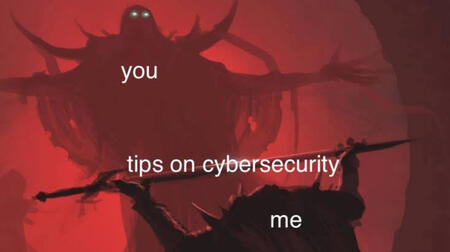(:
staying safe on the internet: tips for better personal protection
(click on the buttons below to begin)
about this guide

This guide invites you to make informed decisions on how you can protect your information from other users, and it lists things to keep in mind if you also need your internet activity private from people offline.
(like if you're in the closet, if your internet activity could put you in life-threatening situations, or if you simply want to know more about privacy. It's actually none of my business what you do with this information.)
doxing
Doxxing (also “doxing”, or “d0xing”, a word derived from “documents”, or “docs”) consists in tracing and gathering information about someone using sources that are freely available on the internet (called OSINT, or Open Source INTelligence).“The more you know about your target, the easier it will be to find their flaws”.Once sensitive information has been found, it may be published for the sake of defamation, to blackmail the target person, or even used for other goals.[source]
personal information
My personal tips:
- Don't display a Carrd revealing your personal information to an unknown and uncontrollable amount of people.
- If after reading this you still want to make a Carrd, make sure you're not putting yourself at risk.
- Information on your special interests can be more revealing than you think.
- Even if you're a minor, the responsibility of keeping yourself safe on the internet falls primarily on who's controlling your internet activity: you.
- Don't use the same username @ for everything unless you want people to be able to find you on different platforms.
- Things such as games to "expose yourself": (your lockscreen, your home screen, your whatever) that people do on Twitter? It’s all data that can be used to cross-reference your accounts in other platforms and find more personal information.
- Posting pictures? Might be good to learn more about EXIF data.
- Alerts from your phone about your passwords are there for a reason. If you get an alert about one of your passwords being exposed, take it seriously and change it immediately, even if it's dozens of passwords that need changing.
- Make good use of two-factor authentication methods.
- Review the privacy settings of the platforms you use.
- Be conscious about third-party apps and services. Before signing in to something using an existing account (Twitter, Facebook, Google, even Spotify) check to see if it gives access to your e-mail and other personal information. Not everything is malicious but doesn't hurt to be cautious.
- It is even better to avoid creating accounts using your Google/Twitter/Facebook account.
- Don't go around clicking on everything that seems interesting. When you click on unverified links, shortlinks or download suspicious apps you increase the risk of exposure to malware [1].
- In the end, you can't really control everything that people share about you but you do have control over how much of yourself you reveal on the internet.
in-real-life
Sometimes all it takes for an irl to find you is googling "[your name] + [your interest that you mentioned in a conversation]".So if you're concerned about your in-real-life people finding you on the internet, make sure you:
- Don't use your real name if your name is uncommon. Use a nickname, use a fake name, don't use a name at all. It all depends on how (paranoid) concerned you are about your anonymity.
- Google yourself and your interests to see if you're already at risk of being exposed.
- Don't post pictures that can give away visual clues as to who you are or where you live, where you study, where you work, etc.
- Block the accounts of people you want to avoid. Chances are they might leave it be if they don't find your account in one simple search using their main account.
- Consider keeping your account private if you suspect you're being targeted by someone. This counts for both online and irl people.
resources
(a few of the useful resources I recommend)
have i been pwned?: Check if your email or phone is in a data breach. If it is, it most likely means your password has also been exposed.Tor Browser: web broswer that anonymizes your web traffic using the Tor network, making it easier to protect your identity online.Online Harassment Field ManualRemoving content from Google searches: FormPersonal Data Removal WorkbookApp Store: Microsoft Authenticator
learn more
What is OSINT? - Open Source IntelligenceAbout Tor and how it worksWhat is VPN?Guide for Self-Doxing and erasing digital footprintsProtecting yourself in social networksGuidelines for Safely Practicing CounterspeechDo I need antivirus for my Android smartphone?If you do want an antivirus app, read more [here], and [here] are some reviews of antivirus apps for Android devices.
Hopefully this carrd has helped you in some way or another, and if it did, sharing it would be hugely appreciated.I am not an expert, and if you find any mistakes on this carrd or if you think there's more that could be added, talk to me on Twitter and I'll see what I can do. Have a great day :)